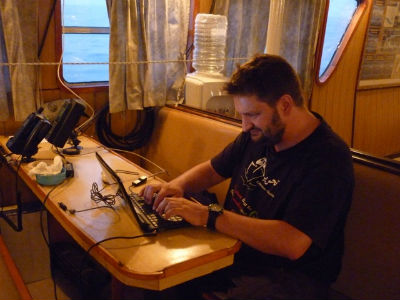It is our first dawn on board the Tahrir in the Mediterranean Sea. Some delegates and journalists are still sleeping, others gradually waking up. The sea got choppy overnight, with equipment crashing off tables and food off counters. This made it hard to sleep at times. The sea looks much rougher than it did as we left the Turkish port of Fethiye, but our captain George says this is pretty normal.
Now that the three TV journalists have uploaded their big files, we have more of our tiny bandwidth for the rest of us to catch up on news. We seem to be having an impact, in media from Egypt and Lebanon, Europe and North America.
The Israeli Occupation Force’s spokeswoman Avital Liebovich says they are “prepared” for us, whatever that means. Then again, she is quoted as saying, “Currently they are far from Israel, but they are headed here and they are headed for Gaza.” It seems to me like the mighty IOF’s navigation tracking is less accurate than they would have us believe: we are of course not heading “there” to Israel — we have no intention or interest in visiting Israel on this trip, in fact. Our explicit goal is to enter Palestinian territoral waters off Gaza directly from international waters. I have looked at our charted course personally, and it quite deliberately gives Israeli waters a wide berth.
If we do wind up in Israel, it will of course be against our will, as a result of acts of international state piracy. Previous Flotilla participants have been deported from Israel for “illegally entering the country” — an unintentional irony, given that the only illegal actions in question are state piracy. International solidarity is not illegal. In fact, according to the Red Cross, it should be an obligation.
Whatever they say publicly, Israel is afraid of boats like ours precisely because of the weapons we are not carrying. Unarmed, peaceful international solidarity focuses attention on their crimes, and shows how bogus their claims of “security” really are. What possible “threat” could a boat with 12 people and no arms on board represent to one of the most heavily armed military machines in the world?
This is also the dawn of what we hope will become a new strategy in the international movement to break the blockade of Gaza. Freedom Waves to Gaza seeks to move away from large flotillas which are inherently cumbersome and difficult to keep quiet, towards more agile actions by smaller numbers of boats, leaving from different places at different, less predictable times, thus keeping the blockaders guessing and making the pressure on them more continuous.
For those from a trade union background, the change can be compared to the difference between a single mass picket and a number of smaller flying pickets. Both tactics are appropriate, in different circumstances. The point is not to become fixed on “one right strategy” but rather to be ready to change tactics in response to each situation, and to try to stay unpredictable.
There are, however, some things that don’t change: our destination remains freedom for the Palestinians of Gaza, and our course remains the conscience of humanity.
David Heap is a member of the Canadian Boat to Gaza steering committee and writes today from on board the Tahrir in the eastern Mediterranean.




